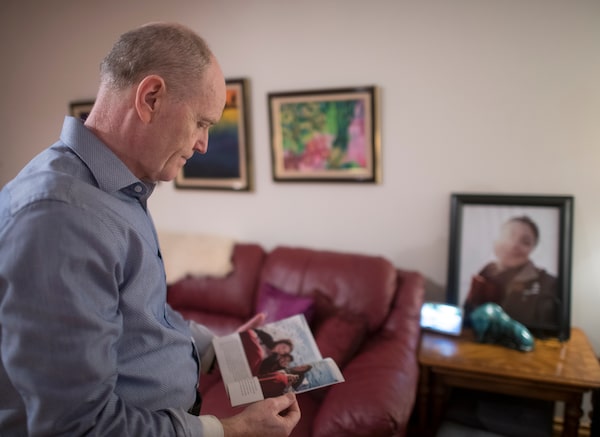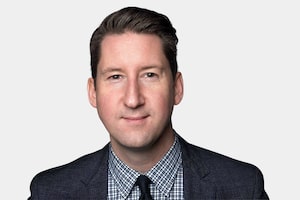
Chris Moore, whose 24-year old daughter, Danielle, died in a Boeing 737 Max crash, at his Toronto home on Jan. 6, 2020.Fred Lum/The Globe and Mail
Chris Moore stared at his computer – empty screen, cursor blinking – wondering how he would ever sum up the entirety of his daughter’s life in 1,500 words.
Mr. Moore had waited months to testify at federal hearings into Canada’s oversight of the Boeing 737 Max. When he finally got his wish, he was told to keep his victim impact statement short. No more than 10 minutes.
Two of the flawed planes had crashed less than five months apart, killing 346 people. His daughter, Danielle, and 17 other Canadians were among them.
Canada’s 737 Max Hearings: The full statements of the victims’ families
Her death tormented him. She was 24, heading to Africa to work with the United Nations, when the new plane was brought down by faulty software that forced it into an irreversible nosedive. When Danielle’s coffin arrived in Canada from the crash site, the first thing the family noticed was how small it was: not all of her remains were found.
She was a singer and a student, an environmentalist and an idealist, a “bright light” who had gone off to university, studied hard and made her parents exceedingly proud. But how do you condense all that into 10 minutes for the government? Should he use the time to honour Danielle, or simply demand action, insisting on tougher aircraft regulations and more scrutiny of Boeing? For weeks, Mr. Moore stewed over the draft at home in Scarborough, Ont.
In Hamilton, Paul Njoroge struggled through the same grim exercise. Five members of his family died in the crash, including his three children, his wife, and his mother-in-law. The two men were strangers with little in common until that day in 2019, when disaster handed them a common denominator.
But when the time came to testify, their moment was delayed by a pandemic. More months passed and they kept revising, through tears and frustration. Mr. Moore wrote eight drafts.
Some were too technical, delving into the quagmire of engineering problems that crash investigators had found, which regulators missed. One of his drafts was angry. Mr. Moore calls it the “hate-filled version.”
“I’m sort of ashamed of it,” he said quietly. “But by writing it, you feel better, and you let it out.”
He eventually settled on a statement that was part eulogy, part lecture. He wrote that Ottawa could have grounded the plane after the first crash in 2018, which would have saved 157 lives, including Danielle’s. “The facts were available,” he wrote, channeling his anger.
He wrote about the need for more transparency into Canada’s approval of the plane, and its over-reliance on the U.S. Federal Aviation Authority to inspect the aircraft, which amounted to an abdication of responsibility. He wrote of Ottawa’s decision not to ground the plane until four days after the second crash, siding with the U.S. aviation sector and putting more travelers at risk. “Let the record show,” Mr. Moore wrote. “Canada was the last.”
And he wrote that Canadians will have little choice but to fly on the 737 Max when it returns in the coming months with newly designed software and promises of lessons learned, because Air Canada and WestJet own dozens of the planes.
Mr. Njoroge’s statement was equally vivid and painful. He wrote of how the plane hit the earth going nearly the speed of sound. How the force of impact drove shards of the wreckage nine metres into the soil.
He wrote about buying the tickets for his family, and how helpless his wife must have felt in those final moments knowing they were all going to die. How she would have seen fear in her children’s eyes.
Mr. Njoroge chastised Boeing for its failures. And regulators for approving the plane, “for rubber-stamping it.”
He challenged Transport Canada to make its private conversations with Boeing public. He said Canadians were left to fly on the 737 Max “unsuspecting.” He called the plane “a flying coffin.”
They were bitter and cathartic words. But most of them went unspoken.
When the hearings resumed in late November, Mr. Moore and Mr. Njoroge were told there had been a mistake. The 10 minutes they each were allotted was actually just five. It was a clerical error. Could they please revise their submitted statements, and shorten whatever they wanted to say?
Both fathers sat down at their computers and began deleting. Five minutes. How to sum up their lives in such a small amount of time?
When Mr. Njoroge appeared at Senate hearings in Washington, U.S. lawmakers imposed no such constraints. “We’ll let you testify until you are done,” Democrat Rick Larsen told him.
When the 737 Max crashed in Ethiopia, the pilot radioed for help one minute into the flight – he was losing control. Six minutes after taking off, it slammed into the earth. Five minutes was all it took.
Now, five minutes was all they had.
After delivering his shortened statement – hundreds of words unsaid – Mr. Njoroge sat silently, staring straight ahead. It looked as though his video feed was frozen. It wasn’t. He just didn’t know how to proceed.
“The difficult thing in life is when you live in a world full of billions of people, but you just feel alone all the time,” he said.
Both men asked for a public inquiry. Critical aspects of the plane’s approval had not been addressed. Mr. Moore submitted nine pages of questions that went unanswered. Boeing hadn’t acknowledged the hearings, and did not appear.
But the men would not get their wish. When it came to delving further, five Liberal and four Conservative MPs voted it down.
“I really feel that we have enough information,” Liberal Helena Jaczek said. “I feel that a public inquiry really couldn’t add any particular value.”
For Mr. Moore and Mr. Njoroge, those words stung about as much as the ones they never got to say.
The Globe and Mail recently obtained full versions of Chris Moore and Paul Njoroge’s statements to the House of Commons transport committee, including the parts they were unable to present at the Canadian proceedings. To read their full statements click here.
 Grant Robertson
Grant Robertson